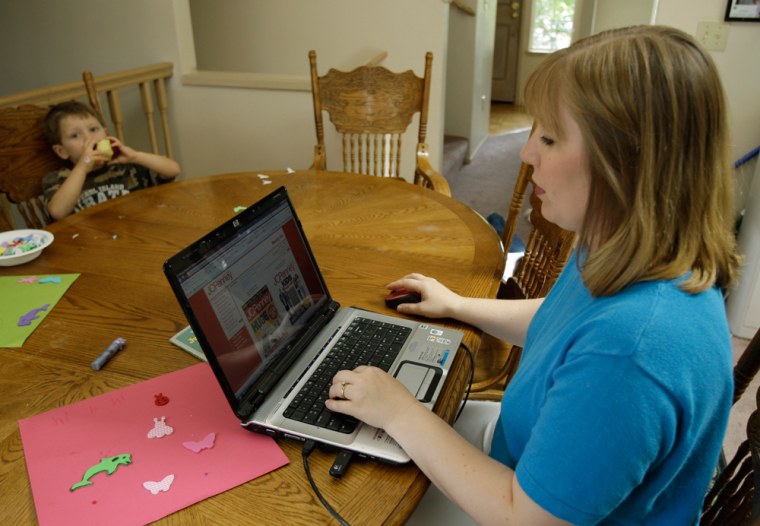Sometimes the best intentions can go awry. Just ask the Federal Reserve, which in its efforts to stop credit-card companies from preying on poor people and students has touched off a battle over stay-at-home moms.
Charged with writing rules implementing the 2009 law designed to curb credit-card abuses, the Fed late last year proposed that card companies consider "individual" rather than "household" income or assets when issuing cards. The change, say lawmakers who worked on the measure, is meant to prevent banks from issuing credit cards to college students who then run up thousands of dollars in debt and have no ability to pay.
The Fed, which has spent most of the financial crisis getting slammed for its lax oversight of consumer credit, took things a step further, interpreting the law to mean that it should keep credit cards out of the hands of anyone without a paycheck or ample personal savings.
That, of course, includes spouses who don't work — husbands in some cases but most often wives. In its November proposal, the Fed said those without an income could get a credit card if a spouse co-signed the application.
Some Fed critics say the proposal makes the central bank look like it is stuck in the 1950s, when women needed their husbands' signatures even to open bank accounts. "Women have worked hard over the course of my lifetime to establish financial independence," says Representative Carolyn B. Maloney (D-N.Y.), one of the authors of the Credit Card Accountability, Responsibility, and Disclosure Act. "If a stay-at-home mom, who's often the one who controls the family finances, cannot easily obtain a credit card in her own name, then that would be a step backward." Anne P. Fortney and Jean Noonan, partners in the Washington office of law firm Hudson Cook, wrote in a Dec. 20 letter: "The proposal undermines 35 years of progress for married women (and married men if they do not work outside the home)."
Policy specialists say fixing the mom flap won't be easy, especially in the post-financial-crisis environment where regulatory zeal is the norm, even if it produces unintended consequences. "This is how it's going to be in Washington," says Brandon Barford, a former Republican Senate Banking Committee aide who is now a vice-president at ACG Analytics, an investment research firm. "Regulators need political cover to fix this, they need to look tough."
Last month, Maloney and Representative Louise Slaughter (D-N.Y.) asked the Fed to keep the household income or assets measure for nonworking spouses, arguing that was Congress's intent. They also pointed out that the proposal could cause "serious risk" for women in abusive relationships who need to get credit without their husbands' knowledge.
Susan Stawick, a Fed spokeswoman, declined to comment on the central bank's interpretation of the credit-card law and whether the regulator plans to change the proposal. The agency hasn't set a deadline for issuing a final rule.
Chain retailers and other stores that sell mainly to women, including Sears Holdings (owner of Lands' End, Kmart, and Sears, Roebuck), The Limited, and Dress Barn are complaining, too. They're concerned they will see a steep drop in the use of private-label store cards, many of which are issued at the point of sale.
Susan Ehrlich, president of financial services at Sears, told the Fed that determining the individual income of a stay-at-home mother could require cashiers to delve into state law issues involving community property as well as pre- and post-nuptial agreements. "Customers may well refuse to discuss such personal information in an environment where privacy to explain these complex issues cannot be assured," she wrote.
Some of the nation's largest consumer advocacy groups praise the Fed's move, saying card issuers have long used the household income measure to give credit to people who can't afford it. "We just want more reality in the setting of credit limits," says Linda Sherry, director of national priorities for Consumer Action, a San Francisco-based nonprofit. "The stay-at-home mom's income is her husband's income. This is splitting hairs."
